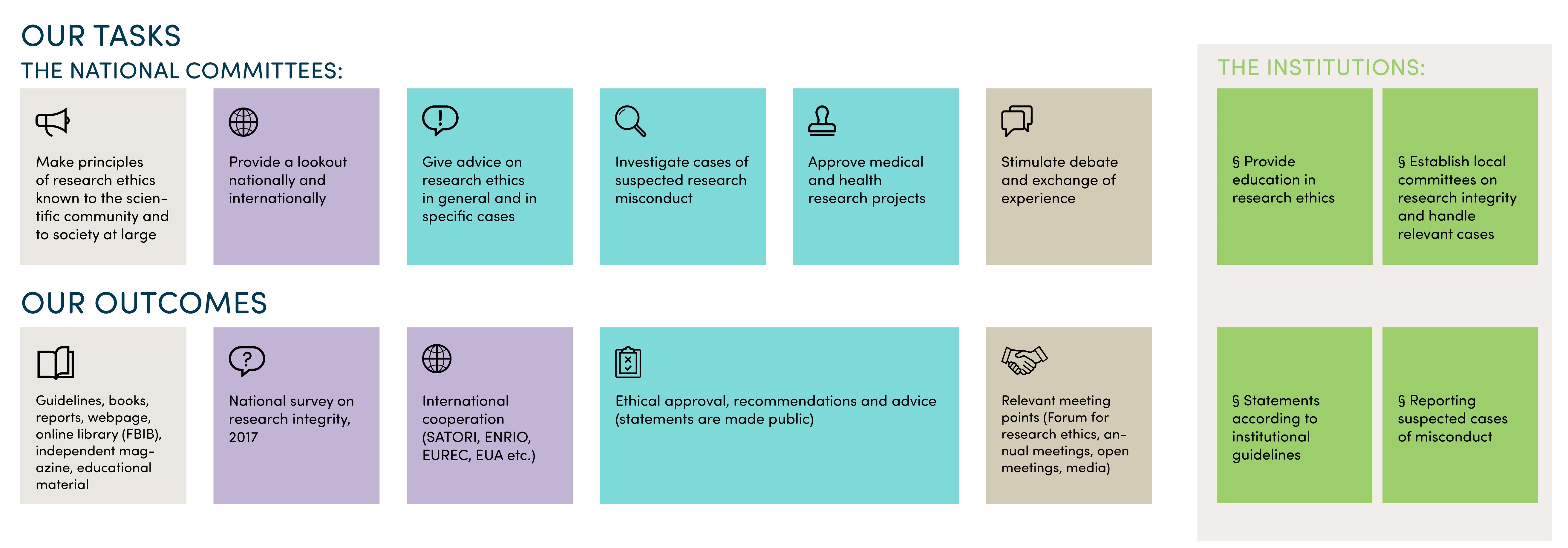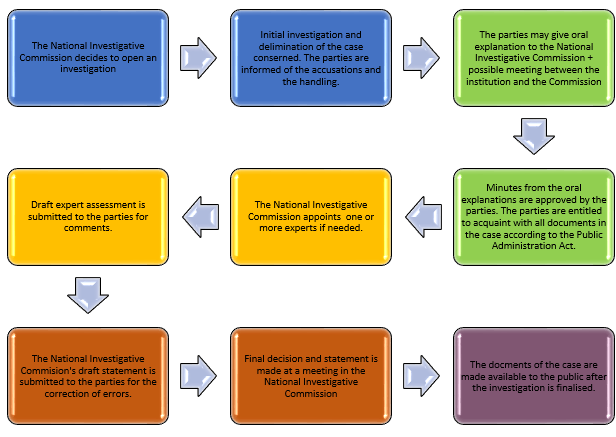The National Research Ethics Committees (NREC)
Founding year
1990
History
The three national research ethics committees, the National Committee for Medical and Health Research Ethics (NEM), the National Committee for Research Ethics in Science and Technology (NENT) and the National Committee for Research Ethics in the Social Sciences and the Humanities (NESH), covering all fields/disciplines, were established by the Norwegian Parliament (Stortinget) in 1990.
In 2007, the Research Ethics Act provided a legal mandate for the three committees together with the establishment of the National Commission for the Investigation of Research Misconduct (GRU). With effect from 1 January 2013, the Norwegian National Research Ethics Committees (NREC) were established as an independent administrative agency. In 2008, the National Committee for Research Ethics on Human Remains was established.
NREC shall ensure that all research is conducted in accordance with recognized research ethical norms, through preventive work, counseling, publishing general and specific decisions and statements, and investigating possible scientific misconduct.
In 2017 a new Research Ethics Act entered into force. Under the Act, research institutions (universities etc.) have the primary responsibility for the teaching and training in research ethics and research integrity, for preventing research misconduct and for handling such allegations. NREC support the institutions in their work through a wide array of activities, such as the development of national research ethical guidelines.
ENRIO member since
Structure
Independent body under the auspices of the ministry of Education and Research
Main Tasks

The overall goal of NREC given by the ministry is ethically sound and responsible research. The main target group is researchers and research institutions, but in the letter of allocation from the ministry it is also stated that other relevant actors should take research ethics into account in their work, and that society should trust research. Thus, NREC has a broad work scope.
One key task for the NREC committees and commission is to develop national research ethics guidelines and to provide guidance and advice to researchers in accordance with these.
Both NREC and its committees and commission publish annual reports about their activities. NREC has a website (www.forskningsetikk.no) with comprehensive information about research integrity.
 Investigation
Investigation
Investigation
Cases concerning breaches of recognised norms of research ethics should usually be dealt with at the local level. If the local level concludes that a researcher has committed research misconduct, the researcher may appeal the conclusion to the National Commission for the Investigation of Research Misconduct. In addition, the Commission can launch investigations on its own initiative. The Commission covers all research fields and deals with research carried out by Norwegian research institutions private or public. It can also investigate cases abroad if the research has been carried out by researchers employed by a Norwegian institution, or if a substantial part of the funding stems from Norway. The Commission is composed of seven members and four substitutes all nominated for a period of four years. The Commission often draws on external national or foreign expertise when handling cases.
The responsibility for sanctions rests with the research institutions. The Commission gives advice to individuals and/or research institutions and act as a knowledge base, i.e. gather information concerning research misconduct in Norway and beyond. All institutions are obliged by law to report to the National Commission about handled cases. The Commission is cooperating with similar organizations abroad. On the national level, the Commission cooperates with the National Committees for Research Ethics, especially on prevention of research misconduct. The National Committees for Research Ethics have published National guidelines on Research Ethics (including research Integrity) since the beginning of the 1990’s. The guidelines have been revised regularly, latest in 2016. Researchers are obliged to know and to follow the guidelines, and they constitute the baseline when investigating allegations of research misconduct.
The National Committees and the Commission publish annual reports about their activities. The Research Ethics Committees (including the Commission) has a website (www.forskningsetikk.no) with comprehensive information about Research Integrity.
Flow chart:

 Training
Training
The research institutions have the primary responsibility for training and teaching in research ethics/research integrity. The National Research Ethics Committees (including the Commission) are not responsible for training as such. However, NREC has established several national initiatives related to training:
- A Research Ethics library containing articles and cases (including on research integrity). This is an online resource for research ethics/integrity education available on the website (www.forskningsetikk.com), also in English.
- A yearly conference for teachers and people responsible for research integrity at the different institutions.
- The secretariat for the Committees takes part in a wide range of teaching activities at different institutions.
 Promoting Research Integrity
Promoting Research Integrity
The research institutions have the primary responsibility for training and teaching in research ethics and research integrity. NREC is not responsible for training as such but has established several national initiatives related to training including:
- A Research Ethics Library containing articles and cases. This is an online resource for research ethics / research integrity education available on the website (researchethics.no English site).
- Several conferences each year for targeted groups, including an annual conference for those teaching research ethics and integrity and members in local research ethics and integrity committees.
- A wide range of teaching activities at research performing institutions.
The national guidelines for research ethics and research integrity are very important tools for promoting good research practices. The committees have published national guidelines on research ethics and research Integrity since the beginning of the 1990’s. The guidelines are revised regularly. Researchers are obliged to know and to follow the guidelines, and they constitute the baseline when investigating allegations of research misconduct. In addition to subject specific guidelines, the committees have developed several area specific guidelines and guides.
NREC publishes The Research Ethics Magazine (Magasinet Forskningsetikk) with three to four issues per year.
NREC also publishes books, reports etc. that are available for free through the website www.forskningsetikk.no.
Handling allegations of research misconduct
As a main rule, cases concerning breaches of recognised research ethical norms should be dealt with at the local level. If the local level concludes that a researcher has committed research misconduct, the researcher may appeal the conclusion to the National Commission for the Investigation of Research Misconduct. In addition, the Commission can launch investigations on its own initiative. The Commission covers all research fields and deals with research carried out by Norwegian research institutions private or public. It can also investigate cases abroad if the research has been carried out by researchers employed by a Norwegian institution, or if a substantial part of the funding stems from Norway. The Commission is composed of eight members and three substitutes all nominated for a period of four years.
The responsibility for sanctions rests with the research institutions. The Commission gives advice to individuals and/or research institutions and acts as a knowledge base, i.e. gather information concerning research misconduct in Norway and beyond. All institutions are obliged by law to report to the National Commission about handled cases.
Contact
Ragnhild Aursnes Dammen
The National Commission for the Investigation of Research Misconduct (Granskingsutvalget)
Kongens gate 14
0153 Oslo - Norway
